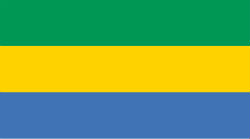In Gabon, there is mixed legal system of French civil law and customary law.
Country overview
Population
2.4m
President
General Brice Oligui Nguema (President of the transition)
Capital city
Libreville
Currency
Central African Franc
Major Industries
Petroleum extraction and refining; manganese, gold; chemicals, ship repair, food and beverages, textiles, lumbering and plywood, cement
Languages
French (official), Fang, Myene, Nzebi, Bapounou/Eschira, Bandjabi
Major religions
Christian 55%-75%, animist, Muslim less than 1%
Legal information
- Capital markets
Corporate Governance Code
Uniform Act of the Organisation for the Harmonisation of Business Law in Africa (Uniform Act of OHADA) relating to commercial companies and economic interest group, a copy of which can be accessed from the arrow icon on the right.
Principal legislation
General regulation of COSUMAF dated 15 January 2009
Regulatory body or bodies
The Commission de Surveillance du Marché Financier de l’Afrique Centrale (COSUMAF)
Exchange
Bourse des Valeurs Mobilières de l'Afrique Centrale (BVMAC)
Current No. of listed companies
6
Principal legislation
Regulation No. 01/22/CEMAC/UMAC/CM/COSUMAF dated 21 July 2022 regulating the organization and operation of the Central African financial market.
Takeover / merger regulations
Uniform Act of OHADA relating to commercial companies and economic interest group
- Competition regulation
Legislation
The relevant legislation applicable in Gabon is the Fair Competition Act 1998 (Act). The Ministry of Economy is the regulatory body which administers the Act. The object of the Act is to provide goods or services to meet the same needs or equivalent for operators.
Scope
The provisions of the Act covers the following areas:
- freedom of trade and prices;
- preventing from anti-competitive practices;
- transparency in commercial transactions;
- regulating the concentration of market; and
- repressing barriers to free competition.
- Corruption / tranparency
Corruption Perception Index rank worldwide for 2022
136
Signatories to United Nations Convention Against Corruption (UNAC)?
Yes
UNAC ratified?
Yes
Signatories to the African Union Convention on Preventing and Combating Corruption?
Yes
Ratified?
Yes
Corruption Perception Index score for 2022
29
Signatories to the OECD Convention on Combating Bribery of Foreign Public Officials in International Business Transactions?
No
- Disputes
Arbitration
As a state member of OHADA, Gabon is governed by the Uniform Act on Arbitration Law, adopted in Conakry (GUINEA) on 23/11/2017 and published in the OHADA Official Journal No. Spécial of 15/12/2017, which governs arbitration in all OHADA member countries. It is intended to apply to all domestic and international arbitration, whether ad hoc or institutional. The Uniform Act on Arbitration does not limit arbitration to commercial and professional matters. Individual and ciorporate bodies alike may refer their disputes to arbitration.
Enforcement of arbitral awards
Gabon became a signatory to the New York Convention on the Recognition and Enforcement of Foreign Arbitral Awards on 15 December 2006. The Convention came into effect in Gabon on 15 March 2007. Gabon recognises the authority of an arbitral award and grants the execution of the award in accordance with the rules of procedure in the territory where the award was invoked.
Perception of the local courts
The perception of the level of corruption remains high.
Gabon was ranked 31 out of 53 African countries (a drop in two places since 2008) based on indicators of corruption and accountability.
Effectiveness of the court system
The court system is a victim of the corruption of the judges by foreigners. There is also a lack of experience on the part of the newly graduated judges.
Judiciary
The President appoints the judges. The judiciary branch was profoundly modified and developed by the constitutional reform of 1991.
Enforcement of foreign judgments
Under Article 34 of the Mutual Legal Assistance Agreement (Agreement) entered into between France and Gabon (each, a Contracting State), the granting of the execution of judgments and extradition decisions made in the territory of one Contracting State has the right and the authority of res judicata in the territory of the other Contracting State, if they meet certain conditions. These conditions relate to:
- the control of indirect jurisdiction of the law applied by the courts of the State of origin of the decision;
- the passage of res judicata;
- the regularity of the proceedings before the judge; and
- compliance with international public order.
Structure of the court system
- Judicial Supreme Court (Cour de Cassation)
- Administrative Supreme Court (Conseil d'Etat)
- Accounting Supreme Court (Cour des Comptes)
- The Constitutional Court
- The Court of State Security
- Primary Courts
The judicial power is exercised by Supreme Courts, Appeal Courts, and Lower Courts.
The judiciary was significantly modified and developed by the constitutional reform of 1991. It comprises of a number of autonomous specialised Supreme Courts namely:
- the Judicial Supreme Court;
- the Administrative Supreme Court;
- the Accounting Supreme Court;
- the Constitutional Supreme Court; and
- the Court of State Security.
- Regulation
Telecommunications
- Law No. 005/2001 regulating telecommunications
- Law No. 004/2001 organising the telecommunication sector
Communication
Law n°019/2016 dated 09 August 2016 on the Communication Code in the Gabonese Republic
Decree n°0434/PR dated 09 August 2016 on the promulgation of law n°019/2016 on the Communication Code
Law No. 026/2018 dated 17/10/2019 regulating electronic communications in the Gabonese Republic
Post
Law No. 06/2001 regulating the post sector
- Taxation
Personal income tax
Residents are taxed on global net income. Non-residents are taxed only on Gabon-source income. Individuals located in Gabon are considered resident. An individual normally is considered located in Gabon if his/her principal residence, main place of business or professional activity or center of financial interests is located in Gabon and he/she spends more than 183 days during a calendar year in Gabon. Taxable income includes employment income, investment income, capital gains, income from real estate and business income. Capital gains derived from the sale of securities are taxed at 20%. Capital gains from the sale of real property are exempt from personal income tax in certain cases. The tax rates on ordinary income are progressive, ranging from 0% to 35%.
Exchange control
Inward direct investment requires prior declaration. “Inward direct investment” means the creation, purchase or expansion of any business entity, but does not include the purchase of less than 10% (or XAF 100 million) of the share capital of a company whose shares are not quoted. Loans obtained by Gabon companies from foreign shareholders or from a foreign enterprise within the same group also require prior authorisation. The reinvestment of undistributed profits is not subject to prior declaration. Transfers outside the Central African Economic and Monetary Union (CEMAC) zone require prior authorisation, except those below XAF 1 million. The transfer must be made through a bank authorised by the central bank to act as an intermediary.
Capital gains tax
Capital gains are treated as ordinary business income and are taxed at the normal corporate income tax rate. However, capital gains realised on the disposal of fixed assets in the course of trading are excluded from income for three years if the taxpayer records the capital gain in a special account and reinvests the gains in new fixed assets for the business. Capital gains resulting from the free allocation of shares, founders’ shares or debentures on the merger of limited liability companies or limited partnerships with share capital also are excluded if the surviving company has its registered office in Gabon or another CEMAC state.
Corporation tax
Gabonese companies are taxed based on the territoriality principle. As a result, Gabonese companies carrying on a trade or business outside Gabon are not taxed in Gabon on the related profits.
Gabonese companies are those registered in Gabon, regardless of the nationality of the shareholders or where the companies are managed and controlled. Foreign companies with activities in Gabon are subject to Gabonese corporate tax on Gabonese-source profits.
A resident company is subject to a corporate income tax rate of 30% and 35% for companies in the mining and oil sectors.
Foreign companies with activities in Gabon are subject to a withholding tax of 10%.
Dividends
Dividends received by a Gabon company from a resident or non-resident company are included in taxable income. When dividends are received by a corporate shareholder that holds at least 25% of the shares of the payer company, the head office of the shareholder and its affiliate are located in Gabon or another CEMAC state and the shares remain registered in the name of the shareholder for at least two consecutive years, the dividends are subject to tax at a 10% rate.
Payroll tax and social security
No Payroll tax
Social security contributions are assessed by the employer on the entire compensation received by an employee, with an annual upper limit of XAF 18 million (XAF 1,500,000 monthly), including benefits in kind and excluding the reimbursement of expenses and allowances. The total rate of the social security contributions is 22.6%, which is shared between the employer (20.1%) and the employee (2.5%).
Interest
Interest paid by a Gabonese company to a non-resident entity is subject to a 10% withholding tax calculated on the gross amount paid (excluding tax on turnover), unless the rate is reduced under a tax treaty.
Value added tax
The standard rate is 18%, with reduced rates of 10% and 5% applying in specific instances. A zero rate applies to qualifying exports that have been properly declared to customs, and international carriage.
Royalties
Royalties paid by a Gabonese company to a non-resident entity are subject to a 10% withholding tax, unless the rate is reduced under a tax treaty.
Losses
Tax losses may be carried forward for up to three years. The carry-back of losses is not permitted.
Real property tax
Owners are liable to a tax based on the rental value of the property at a rate of 15%.
